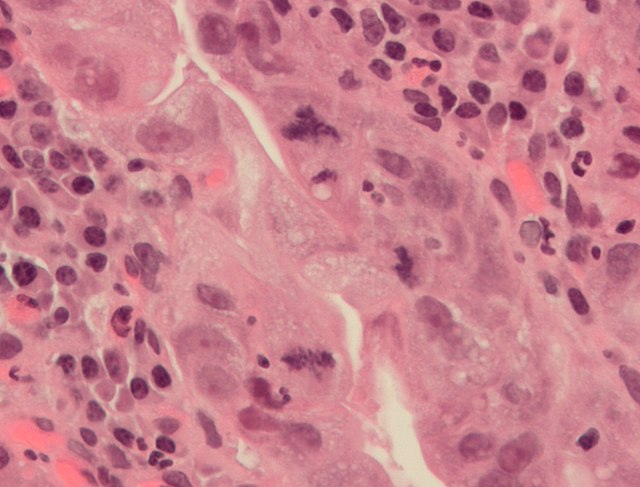Telophase is the final stage in both meiosis and mitosis in a eukaryotic cell. During telophase, the effects of prophase and prometaphase are reversed. As chromosomes reach the cell poles, a nuclear envelope is re-assembled around each set of chromatids, the nucleoli reappear, and chromosomes begin to decondense back into the expanded chromatin that is present during interphase. The mitotic spindle is disassembled and remaining spindle microtubules are depolymerized. Telophase accounts for approximately 2% of the cell cycle's duration.
Fluorescence micrograph of a human cell in telophase showing chromosomes (DNA) in blue, microtubules in green and kinetochores in pink
Mitosis is a part of the cell cycle in which replicated chromosomes are separated into two new nuclei. Cell division by mitosis is an equational division which gives rise to genetically identical cells in which the total number of chromosomes is maintained. Mitosis is preceded by the S phase of interphase and is followed by telophase and cytokinesis, which divide the cytoplasm, organelles, and cell membrane of one cell into two new cells containing roughly equal shares of these cellular components. The different stages of mitosis altogether define the mitotic phase of a cell cycle—the division of the mother cell into two daughter cells genetically identical to each other.
Onion cells in different phases of the cell cycle enlarged 800 diameters. a. non-dividing cells b. nuclei preparing for division (spireme-stage) c. dividing cells showing mitotic figures e. pair of daughter-cells shortly after division
A cell in late metaphase. All chromosomes (blue) but one have arrived at the metaphase plate.
Ciliate undergoing cytokinesis, with the cleavage furrow being clearly visible
An abnormal (tripolar) mitosis (12 o'clock position) in a precancerous lesion of the stomach (H&E stain)





